
The Grand History of Croatia - A Mega Campaign AAR
- Thread starter CountArach
- Start date
-
We have updated our Community Code of Conduct. Please read through the new rules for the forum that are an integral part of Paradox Interactive’s User Agreement.
You are using an out of date browser. It may not display this or other websites correctly.
You should upgrade or use an alternative browser.
You should upgrade or use an alternative browser.
He's Arab. His son is Greek though.
Probably an update tonight. A combination of a tough week at Uni, actually playing CK and not feeling well have kept me a it behind this week.
Probably an update tonight. A combination of a tough week at Uni, actually playing CK and not feeling well have kept me a it behind this week.
Chapter 7 – 1167 to 1169
The beginning of 1167 saw a minor conflict with the Church. The church asked for the right to collect extra tithes from free peasants, yet King Tomislav refused this. He realised that the peasants could not truly afford it, though he made no effort to reduce the taxes he was collecting from them. The good of the Kingdom was more important than the good of the Church in King Tomislav’s eyes. 1167 was a very peaceful year, given what had occurred in the previous two years and as such little of significance occurred in it, except the death of Julia, King Tomislav’s youngest sister whom he loved very deeply.
This death would have much larger ramifications than anyone could foresee. King Tomislav spent several weeks of August in mourning for her, which was rather excessive given the high mortality rate in the Middle Ages. In January 1168 King Tomislav’s brother Ladislav also passed away, and again the King went into mourning. This time, however, he did not stop mourning his brother until late April. The King ate very little and talked to no one bar his most trusted advisors, and then only sparingly.
Finally the King came out of mourning on April 27th, leaving his chamber for the first time in almost two weeks. He was a very different man. Courtiers would later write of a man “…with sunken eyes, perpetually downcast. His hair was shaggy and had greyed a great deal, more than is normal in three months. His beard was unkempt and his moustache overgrown. There was a perpetual slump in his shoulders and altogether he looked like a man who had been destroyed by life.” (Rheinfalder: 1173). From this time forward, King Tomislav was a changed man.
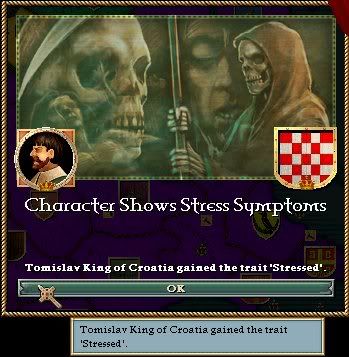
King Tomislav becomes stressed after the death of most of his siblings.
Even though King Tomislav had returned from his quarters he was still rather withdrawn and no long felt like running his Kingdom. This spurred him on to hand some of his northern lands over to various people, including giving his second son Ljutomisl the County of Vas. This led to further decentralisation and in some ways was a return to the days of King Trpimir, where the King owned only very small segments of lands in his demesne.
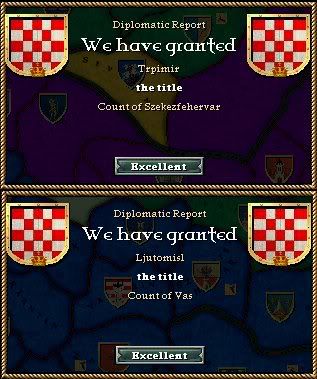
King Tomislav decentralises the Kingdom.
As the Kingdom ran itself King Tomislav relapsed into further depression. He had never been one who could cope with death well, as exhibited by his unwillingness to lead men into battle himself. By April 1169 King Tomislav had started to become increasingly erratic, and would wake up in the middle of the night screaming out the names of his siblings. This would only serve to depress him further and he would lay awake all night crying (At least if the various Courtiers are to be believed).
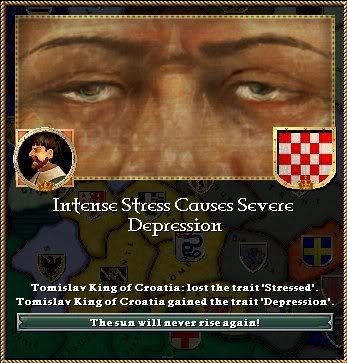
King Tomislav’s stress worsens into depression.
Things were not helped when the King’s Chancellor, Iljko, committed suicide in late November of 1169 due to his own personal problems (As well as various charges from other Courtiers that he had embezzled funds from various docks – these charges have since been shown to indeed be correct). King Tomislav himself started to contemplate suicide in the back of his mind, as his own personal writing show. He also started to develop an intense fascination with death and the afterlife, even going so far as to insist that his Court servants change their livery to be all black to resemble mourning with only a small coat of arms added to it.
During early December the Emperor Sau’d Bagranti saw what the King’s mental state was becoming and, under the pretext of reclaiming his rightful lands, he declared war on the County of Rashka which was the demesne of the younger Tomislav. King Tomislav, upon hearing of this, instantly rose to his son’s defence and ordered his entire Kingdom mobilised. This war would not be as long as the previous Croatian-Byzantine war, but this one would be fought on a much larger scale.
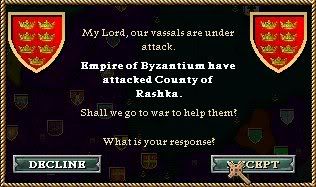
The second Byzantine-Croatian war begins.
The next chapter shall examine the war with the Byzantines and we shall then observe up until the end of 1174, as King Tomislav’s mental state starts to seriously affect the Kingdom.
The beginning of 1167 saw a minor conflict with the Church. The church asked for the right to collect extra tithes from free peasants, yet King Tomislav refused this. He realised that the peasants could not truly afford it, though he made no effort to reduce the taxes he was collecting from them. The good of the Kingdom was more important than the good of the Church in King Tomislav’s eyes. 1167 was a very peaceful year, given what had occurred in the previous two years and as such little of significance occurred in it, except the death of Julia, King Tomislav’s youngest sister whom he loved very deeply.
This death would have much larger ramifications than anyone could foresee. King Tomislav spent several weeks of August in mourning for her, which was rather excessive given the high mortality rate in the Middle Ages. In January 1168 King Tomislav’s brother Ladislav also passed away, and again the King went into mourning. This time, however, he did not stop mourning his brother until late April. The King ate very little and talked to no one bar his most trusted advisors, and then only sparingly.
Finally the King came out of mourning on April 27th, leaving his chamber for the first time in almost two weeks. He was a very different man. Courtiers would later write of a man “…with sunken eyes, perpetually downcast. His hair was shaggy and had greyed a great deal, more than is normal in three months. His beard was unkempt and his moustache overgrown. There was a perpetual slump in his shoulders and altogether he looked like a man who had been destroyed by life.” (Rheinfalder: 1173). From this time forward, King Tomislav was a changed man.

King Tomislav becomes stressed after the death of most of his siblings.
Even though King Tomislav had returned from his quarters he was still rather withdrawn and no long felt like running his Kingdom. This spurred him on to hand some of his northern lands over to various people, including giving his second son Ljutomisl the County of Vas. This led to further decentralisation and in some ways was a return to the days of King Trpimir, where the King owned only very small segments of lands in his demesne.

King Tomislav decentralises the Kingdom.
As the Kingdom ran itself King Tomislav relapsed into further depression. He had never been one who could cope with death well, as exhibited by his unwillingness to lead men into battle himself. By April 1169 King Tomislav had started to become increasingly erratic, and would wake up in the middle of the night screaming out the names of his siblings. This would only serve to depress him further and he would lay awake all night crying (At least if the various Courtiers are to be believed).

King Tomislav’s stress worsens into depression.
Things were not helped when the King’s Chancellor, Iljko, committed suicide in late November of 1169 due to his own personal problems (As well as various charges from other Courtiers that he had embezzled funds from various docks – these charges have since been shown to indeed be correct). King Tomislav himself started to contemplate suicide in the back of his mind, as his own personal writing show. He also started to develop an intense fascination with death and the afterlife, even going so far as to insist that his Court servants change their livery to be all black to resemble mourning with only a small coat of arms added to it.
During early December the Emperor Sau’d Bagranti saw what the King’s mental state was becoming and, under the pretext of reclaiming his rightful lands, he declared war on the County of Rashka which was the demesne of the younger Tomislav. King Tomislav, upon hearing of this, instantly rose to his son’s defence and ordered his entire Kingdom mobilised. This war would not be as long as the previous Croatian-Byzantine war, but this one would be fought on a much larger scale.

The second Byzantine-Croatian war begins.
The next chapter shall examine the war with the Byzantines and we shall then observe up until the end of 1174, as King Tomislav’s mental state starts to seriously affect the Kingdom.
@ stnylan - That makes one of us 
@ Enewald - From memory they have all of their holdings west of the Black Sea, they have most of Asia Minor, some of the inner part of the mid-East and a few other places.
@ Enewald - From memory they have all of their holdings west of the Black Sea, they have most of Asia Minor, some of the inner part of the mid-East and a few other places.
Sorry for leaving everyone in the dark for the better part of a week - I started working today and I had a very rushed week at Uni that just sort of built up on me. I will have the next chapter up tomorrow.
CountArach said:Sorry for leaving everyone in the dark for the better part of a week - I started working today and I had a very rushed week at Uni that just sort of built up on me. I will have the next chapter up tomorrow.
That is simply unacceptable. Working! And- and making money!
Congratulations, and we'll look forward to the next update.
@ phargle - Thanks, I'll try not to do it too often 
@ demokratickid - When are there ever not wars in this story?
@ demokratickid - When are there ever not wars in this story?
Chapter 8 – 1170 to 1174
The Kingdom of Croatia now found itself at war with its largest contenders in the Balkan region – The Byzantine Empire. King Tomislav had declared a Grand Mobilisation and all of his nobles had accepted. The Croatians were mustered and were ready to face off against the Byzantine foe. The war that followed was to be much shorter, yet far bloodier, than the previous Byzantine War.
The first cation occurred during February, when King Tomislav ordered part of his army (some 9000 men under Duke Kresimir of Bosnia) to make an effort to move towards Constantinople again. This time the plan was that the assault on Constantinople would be much smaller, given how the odds had been stacked against the Croatians in Serbia during the previous war. They crossed the border towards modern-day Belgrade, and then moved into the County of Vidin. On April 28th the first conflict of the war began.
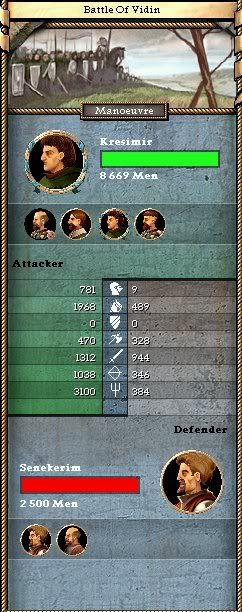
April 28th 1170 – The campaign in Vidin begins.
The 2500 soldiers they came into contact with were able to defend several towns at once, thus slowing the offensive. The very first town that was arrived at (Whose name has unfortunately been lost to us) saw a mass assault of several thousand Croatian soldiers. They were led by King Tomislav’s Marshal Zvonimir. He charged up the hill that the town was situated on at the head of a squadron of knights. Their charge faltered, however, and he was dragged down from his horse. Despite the best efforts of the other knights with him, Marshal Zvonimir was beaten to death. The assault halted in its tracks and withdrew.
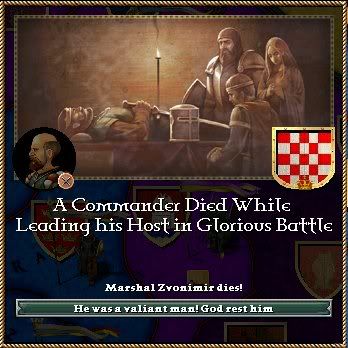
April 30th 1170 – Marshal Zvonimir dies on the battlefield.
The second-in-command, Marshal Imre Csanad was with King Tomislav at the time and he was appointed to be the official Marshal, though he was nowhere near as talented. Nevertheless, the loss of Marshal Zvonimir only delayed matters for a couple of days and soon enough the Croatians were able to make break throughs in the two smaller towns, thus leaving the third one isolated from support. Count Senekerim , the Byzantine leader, thought that it would be prudent to withdraw with what remained of his armies. This is what he did, leaving more than a third of his army dead or severely injured on the field of battle.
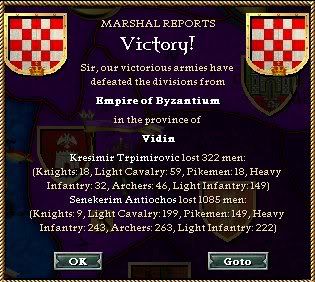
May 12th 1170 – The campaign in Vidin ends.
The Croatians wouldn’t have much time to do more than simply bury their dead before they were forced to fight a defensive campaign in Vidin. Count Ioannes led 4000 men north to attack the 8300 or so who remained with Duke Kresimir. The Duke knew that he could play for time and await reinforcements from Duke Andras, who was marching North-East and could take the Byzantines in the rear. This is what occurred and on June 15th, a major battle was fought near the location of Marhal Zvonimir’s death and the Byzantine Army was utterly crushed. The northern part of the campaign had truly been won by the Croatians. Now all eyes turned to the south, where the greatest clash of arms in the entire Century would occur.
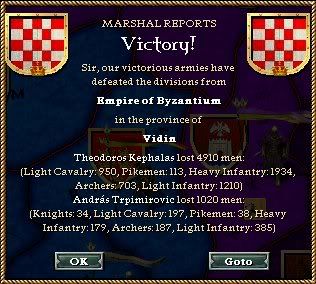
June 15th 1170 – The second campaign in Vidin ends with a decisive Croatian victory.
Meanwhile in the South, King Tomislav was organising an assault on the Byzantine forces massing on his border. He had 20000 men with him and assumed that this would be enough to overwhelm any opposition to him. It turned out that the Byzantine Emperor had 21000 soldiers with him as well, and thus the stage was set for what could be a Kingdom-shattering event.
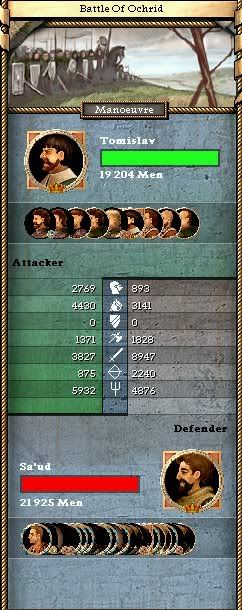
July 4th 1170 – The campaign in Ochrid begins.
The major conflict came within days of the two armies meeting each other within the County. King Tomislav decided that he would not be subtle and he ordered an all-out charge with his knights (Of course remaining well away from the action himself). This charge failed miserably, but it did succeed in taking out many of the archers that the Byzantines had with them.
The final clash of arms occurred on July 19th, when both armies faced each other along a small valley with little room to manoeuvre. The Byzantine superiority in swordsmen was somewhat mitigated in these conditions, but at the same time the Croatian cavalry superiority could not show through. Te casualties were immense and both armies were forced back to their camps after a day of fighting. Some of the generals of the Emperor got together for a meeting, and overnight they agreed to disband their forces. The reasons are not entirely clear, though most scholarship believes that they were planning a civil war (In actual fact none followed, but some of the evidence appears to point to this). Either way, the campaign was over, with a technical victory for King Tomislav.
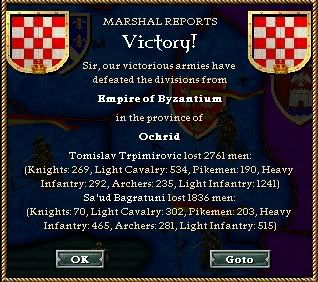
July 19th 1170 – The campaign in Ochrid ends.
Now that the main Byzantine armies had been disbanded it was almost inevitable that Ochrid would fall. This is exactly what would happen on July 30th. King Tomislav sent out messengers to Emperor Sa’ud offering peace if Ochrid was handed over. The Emperor naturally agreed, as he was busy rounding up those generals who had betrayed him. This was the furthest into Serbia that the Croatians had ever penetrated and it set a new standard that following Kings would have to follow.
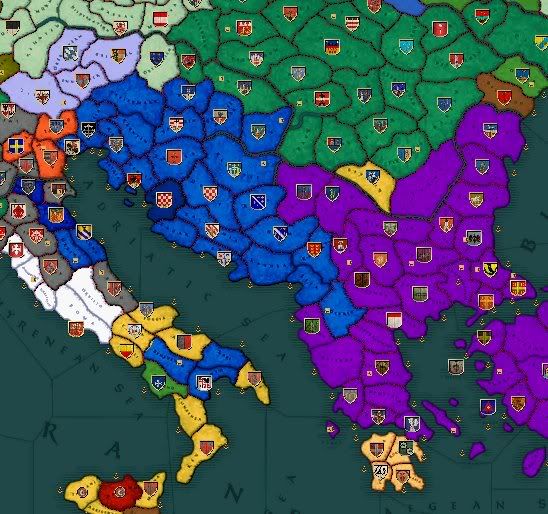
The Kingdom of Croatia after the peace treaty.
Almost immediately following the war, King Tomislav’s mental condition worsened again. After all Emperor Sa’ud had been betrayed by his nobles and what was to stop King Tomislav’s nobles from doing the same thing? When the matter of funding the previous war arose the nobles did not want to share the cost too much. Most of the King’s vassals believed that the cost of the war should be paid by King Tomislav alone – the vassals had already paid their soldiers. King Tomislav then demanded that they pay their dues, or risk the armies of the King invading the demesnes.
Of course, this managed to share most of the nobles into submission, except for Count Tomislav the Younger of Rashka. The Count broke off from his father because he could not afford to pay his dues – The young Count had been forced to pay for all of the feed for the army during the previous campaign and already there was a famine because of this. The result of this entire affair was that King Tomislav now was able to threaten his nobles into submission in most cases. Thus the word of the King was law from now on, and King Tomislav’s will was done without question.
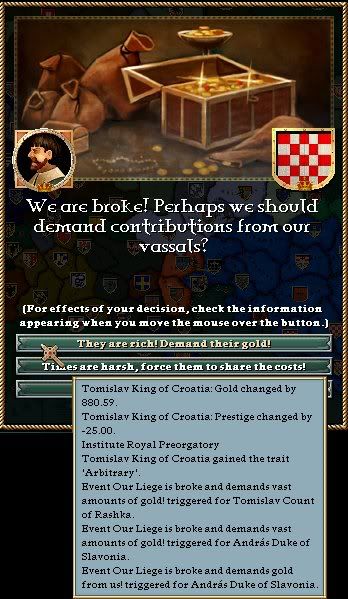
The matter of funding the war means that King Tomislav is forced to threaten his vassals with violence if they do not pay.
The County of Veglia quickly broke off from the Kingdom as well, and instead they pledged themselves to the Duke of Slavonia, Andras Trpimirovic. King Tomislav was not overly concerned, as long as he continued to receive most of the revenues generated by the County. This money was put to useless things such as paying for the tutelage of Luka Trpimirovic, the King’s third son. This in fact put the Kingdom so far into debt that several serious economic steps were taken – including selling forestry rights and fishing rights across the Kingdom. Eventually the money problems were solved by borrowing copious amounts of money from the moneylenders. King Tomislav was now a slave to the men he had always loathed.
In fact the years 1172 to 1174 are largely characterised by economic recovery and King Tomislav becoming more and more erratic. The vassals of the Kingdom found themselves becoming more and more upset with the state of affairs – they had ceded much of their power to the King due to not being able to match him on the field. They started to complain to King Tomislav en masse, and King Tomislav simply responded the same way to all of them “Your problems are none of my concern. Grant me the tribute I ask for or you shall be ruthlessly crushed and your wives and daughters shall be handed over to the army for sport.” After hearing this no one complained twice.
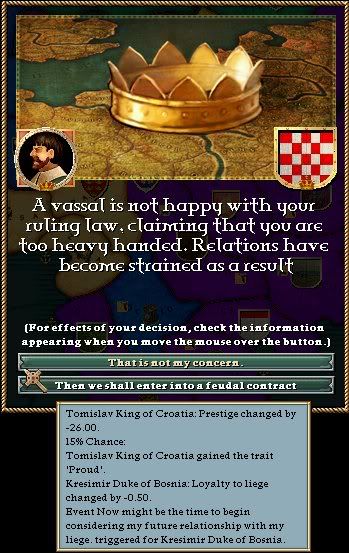
1172 – 1174 – The vassals of King Tomislav start to complain about the state of affairs.
That concludes us up until the end of 1174. In the next chapter we shall examine the world in 1175.
The Kingdom of Croatia now found itself at war with its largest contenders in the Balkan region – The Byzantine Empire. King Tomislav had declared a Grand Mobilisation and all of his nobles had accepted. The Croatians were mustered and were ready to face off against the Byzantine foe. The war that followed was to be much shorter, yet far bloodier, than the previous Byzantine War.
The first cation occurred during February, when King Tomislav ordered part of his army (some 9000 men under Duke Kresimir of Bosnia) to make an effort to move towards Constantinople again. This time the plan was that the assault on Constantinople would be much smaller, given how the odds had been stacked against the Croatians in Serbia during the previous war. They crossed the border towards modern-day Belgrade, and then moved into the County of Vidin. On April 28th the first conflict of the war began.

April 28th 1170 – The campaign in Vidin begins.
The 2500 soldiers they came into contact with were able to defend several towns at once, thus slowing the offensive. The very first town that was arrived at (Whose name has unfortunately been lost to us) saw a mass assault of several thousand Croatian soldiers. They were led by King Tomislav’s Marshal Zvonimir. He charged up the hill that the town was situated on at the head of a squadron of knights. Their charge faltered, however, and he was dragged down from his horse. Despite the best efforts of the other knights with him, Marshal Zvonimir was beaten to death. The assault halted in its tracks and withdrew.

April 30th 1170 – Marshal Zvonimir dies on the battlefield.
The second-in-command, Marshal Imre Csanad was with King Tomislav at the time and he was appointed to be the official Marshal, though he was nowhere near as talented. Nevertheless, the loss of Marshal Zvonimir only delayed matters for a couple of days and soon enough the Croatians were able to make break throughs in the two smaller towns, thus leaving the third one isolated from support. Count Senekerim , the Byzantine leader, thought that it would be prudent to withdraw with what remained of his armies. This is what he did, leaving more than a third of his army dead or severely injured on the field of battle.

May 12th 1170 – The campaign in Vidin ends.
The Croatians wouldn’t have much time to do more than simply bury their dead before they were forced to fight a defensive campaign in Vidin. Count Ioannes led 4000 men north to attack the 8300 or so who remained with Duke Kresimir. The Duke knew that he could play for time and await reinforcements from Duke Andras, who was marching North-East and could take the Byzantines in the rear. This is what occurred and on June 15th, a major battle was fought near the location of Marhal Zvonimir’s death and the Byzantine Army was utterly crushed. The northern part of the campaign had truly been won by the Croatians. Now all eyes turned to the south, where the greatest clash of arms in the entire Century would occur.

June 15th 1170 – The second campaign in Vidin ends with a decisive Croatian victory.
Meanwhile in the South, King Tomislav was organising an assault on the Byzantine forces massing on his border. He had 20000 men with him and assumed that this would be enough to overwhelm any opposition to him. It turned out that the Byzantine Emperor had 21000 soldiers with him as well, and thus the stage was set for what could be a Kingdom-shattering event.

July 4th 1170 – The campaign in Ochrid begins.
The major conflict came within days of the two armies meeting each other within the County. King Tomislav decided that he would not be subtle and he ordered an all-out charge with his knights (Of course remaining well away from the action himself). This charge failed miserably, but it did succeed in taking out many of the archers that the Byzantines had with them.
The final clash of arms occurred on July 19th, when both armies faced each other along a small valley with little room to manoeuvre. The Byzantine superiority in swordsmen was somewhat mitigated in these conditions, but at the same time the Croatian cavalry superiority could not show through. Te casualties were immense and both armies were forced back to their camps after a day of fighting. Some of the generals of the Emperor got together for a meeting, and overnight they agreed to disband their forces. The reasons are not entirely clear, though most scholarship believes that they were planning a civil war (In actual fact none followed, but some of the evidence appears to point to this). Either way, the campaign was over, with a technical victory for King Tomislav.

July 19th 1170 – The campaign in Ochrid ends.
Now that the main Byzantine armies had been disbanded it was almost inevitable that Ochrid would fall. This is exactly what would happen on July 30th. King Tomislav sent out messengers to Emperor Sa’ud offering peace if Ochrid was handed over. The Emperor naturally agreed, as he was busy rounding up those generals who had betrayed him. This was the furthest into Serbia that the Croatians had ever penetrated and it set a new standard that following Kings would have to follow.

The Kingdom of Croatia after the peace treaty.
Almost immediately following the war, King Tomislav’s mental condition worsened again. After all Emperor Sa’ud had been betrayed by his nobles and what was to stop King Tomislav’s nobles from doing the same thing? When the matter of funding the previous war arose the nobles did not want to share the cost too much. Most of the King’s vassals believed that the cost of the war should be paid by King Tomislav alone – the vassals had already paid their soldiers. King Tomislav then demanded that they pay their dues, or risk the armies of the King invading the demesnes.
Of course, this managed to share most of the nobles into submission, except for Count Tomislav the Younger of Rashka. The Count broke off from his father because he could not afford to pay his dues – The young Count had been forced to pay for all of the feed for the army during the previous campaign and already there was a famine because of this. The result of this entire affair was that King Tomislav now was able to threaten his nobles into submission in most cases. Thus the word of the King was law from now on, and King Tomislav’s will was done without question.

The matter of funding the war means that King Tomislav is forced to threaten his vassals with violence if they do not pay.
The County of Veglia quickly broke off from the Kingdom as well, and instead they pledged themselves to the Duke of Slavonia, Andras Trpimirovic. King Tomislav was not overly concerned, as long as he continued to receive most of the revenues generated by the County. This money was put to useless things such as paying for the tutelage of Luka Trpimirovic, the King’s third son. This in fact put the Kingdom so far into debt that several serious economic steps were taken – including selling forestry rights and fishing rights across the Kingdom. Eventually the money problems were solved by borrowing copious amounts of money from the moneylenders. King Tomislav was now a slave to the men he had always loathed.
In fact the years 1172 to 1174 are largely characterised by economic recovery and King Tomislav becoming more and more erratic. The vassals of the Kingdom found themselves becoming more and more upset with the state of affairs – they had ceded much of their power to the King due to not being able to match him on the field. They started to complain to King Tomislav en masse, and King Tomislav simply responded the same way to all of them “Your problems are none of my concern. Grant me the tribute I ask for or you shall be ruthlessly crushed and your wives and daughters shall be handed over to the army for sport.” After hearing this no one complained twice.

1172 – 1174 – The vassals of King Tomislav start to complain about the state of affairs.
That concludes us up until the end of 1174. In the next chapter we shall examine the world in 1175.
A very nice limited war. Your armored advantage over that larger Byzantine army seems to have made a big difference - I wondered if their 3-1 advantage in archers would crap you out in charges, and it does seem you took more casualties. . . I am guessing your martial skill outstrips the Greeks', and they just broke ranks and fled? Anyway, I like limited wars, and it's need to see so much sound and fury over a few minor provinces.
Well I'll be honest - I really don't know what happened. The AI armies disbanded for some reason and I think they might have gotten the event with "betrayed" due to Count Tomislav's Intrigue being at 30. So I decided not to push my advantage too much.
Looks like he is a very strong king.
Well, that was not like Manzikert for Byzant.
Well, that was not like Manzikert for Byzant.
@ Enewald - I'm starting to think Byzantinum may not actually fall, in fact I think it may grow larger...
@ asd - Yep, it is a good thing.
Next chapter may be delayed a little - I forgot how long it takes to make these maps...
@ asd - Yep, it is a good thing.
Next chapter may be delayed a little - I forgot how long it takes to make these maps...
It should be obvious to all that this is dead - it has been a month since I updated. I just felt bad about letting it die without explanation.
Basically quite a bit has been happening in my life lately. None of it bad, don't worry. I've started working, which is taking up my weekends (The time I really get to write) and University has increased the workload placed on me. When you combine that with my increasing frustration with CK I just stopped caring about this and I couldn't bring myself to write something I couldn't enjoy. So there it is.
I'm sorry, and look out in the future for me to write something else.
Basically quite a bit has been happening in my life lately. None of it bad, don't worry. I've started working, which is taking up my weekends (The time I really get to write) and University has increased the workload placed on me. When you combine that with my increasing frustration with CK I just stopped caring about this and I couldn't bring myself to write something I couldn't enjoy. So there it is.
I'm sorry, and look out in the future for me to write something else.

